Like any decent cake (and we saw plenty on the Holland Park stage), a tasty production of Hansel and Gretel needs a careful balance of flavours. Sweet and sharp; light and dark; fantasy and realism; fright and delight. Directed by John Wilkie, Opera Holland Park’s version of Engelbert Humperdinck’s well-preserved “fairy-tale opera” from 1893 skilfully mixes its ingredients into a sort of Great Grimm Bake-Off. It hints at horrors but never really threatens to turn sour. Opera-goers may well sample more challenging, or sinister, readings of Humperdinck’s fruity mix of folkloric pantomime and Wagnerian music-drama. On a warm summer’s evening, though, an endearing cast, smart staging and savoury music-making ensured that this recipe slipped down very easily and satisfied the house.
That’s no faint praise: with this much-loved (hence over-familiar) piece, directors may double down unwisely on comedy, folksiness, or menace. Wilkie’s early 20th-century setting deftly conjured fears and threats, both social and supernatural, but made sure that we saw them pleasurably overcome. And, in this fairy-tale forest where you might encounter Marlene Dietrich film posters or jackbooted, uniformed bullies, the overriding dread of hunger lent proceedings a Depression-era edge. Without spoiling any of the fun, this turned out to be a Hansel and Gretel that suited cost-of-living-crisis times. A programme advertisement for the Kensington and Chelsea Foundation aptly informed us that, in the wealthy Royal Borough, one in four children lives in poverty.
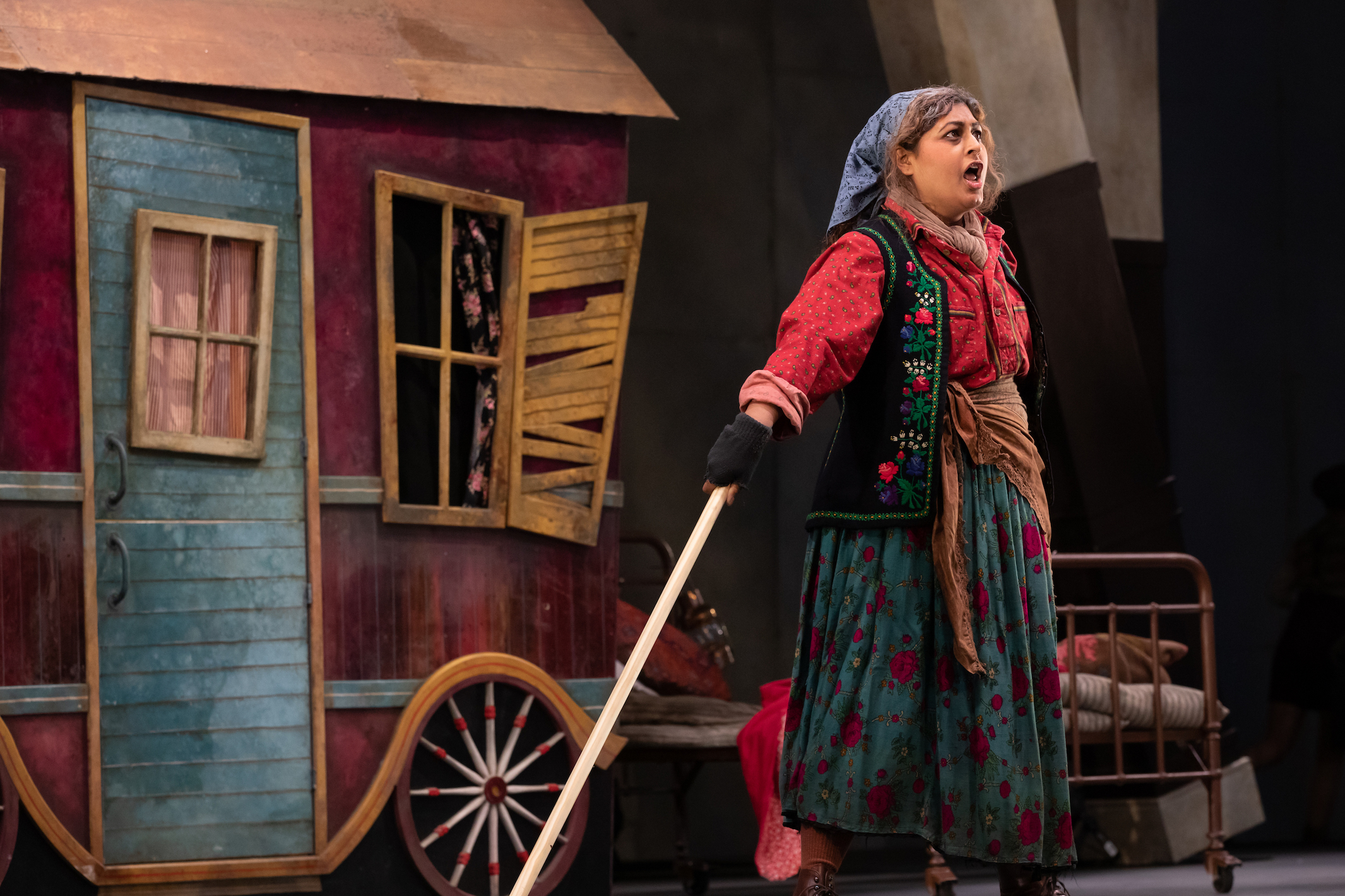 However, realism never fully ousted dreams, or nightmares. As conductor Kǎrin Hendrickson and the City of London Sinfonia played the overture, fairy-tale characters pranced around the siblings’ bed, almost in Stephen Sondheim style. Neil Irish’s design made canny use of the stage’s broad expanses, and the generous movements it allows, at the same time as he caught the eye with picturesque touches reminiscent of classic children’s-book illustrations or, later, splashes of Hollywood-musical glitz. Meanwhile, the broomsticks that give the children’s father Peter his scant livelihood furnished a creepy silhouette ballet behind a sheet. On the edge of these woods, the domestic and the fantastic always intersect. Still, Wilkie avoided heavy-handed ways of making plain that the broom-makers’ hut (in this case a kind of dilapidated caravan) and the witch’s cottage may not, emotionally, stand too far apart from each other – for instance, by doubling the parts of mother and Witch as some directors do.
However, realism never fully ousted dreams, or nightmares. As conductor Kǎrin Hendrickson and the City of London Sinfonia played the overture, fairy-tale characters pranced around the siblings’ bed, almost in Stephen Sondheim style. Neil Irish’s design made canny use of the stage’s broad expanses, and the generous movements it allows, at the same time as he caught the eye with picturesque touches reminiscent of classic children’s-book illustrations or, later, splashes of Hollywood-musical glitz. Meanwhile, the broomsticks that give the children’s father Peter his scant livelihood furnished a creepy silhouette ballet behind a sheet. On the edge of these woods, the domestic and the fantastic always intersect. Still, Wilkie avoided heavy-handed ways of making plain that the broom-makers’ hut (in this case a kind of dilapidated caravan) and the witch’s cottage may not, emotionally, stand too far apart from each other – for instance, by doubling the parts of mother and Witch as some directors do.
As mischievous, risk-taking brother and sister, Charlotte Badham (Hansel) and Laura Lolita Perešivana (Gretel) found strongly individual vocal styles, tapped into a vein of needling rivalry as well as sibling solidarity, and never sounded remotely twee. Perešivana’s “Little Suzy” song unveiled some rich lyric-soprano colours, and their dance showed off a cabaret-level pizzazz. Then the poignant desperation of Meeta Raval’s Gertrud (pictured above), their mother, arrived to haul us back to the tough reality of fairyland on the breadline. As father Peter, Paul Carey Jones had (literally) got on his bike to flog his brooms. He rode back home with a show-stealing “Ral-la-la-la” song that, with its scorching disdain for the rich, thrust us almost into the Brechtian dramatic territory of a generation later. Carey Jones (pictured below) found terrific charisma in the role, his sonorous bass-baritone joviality inflected with a rasp of underlying anger as he insisted that “Hunger is a raging beast”. We grasped that, in this wood, it’s empty purses that will ultimately devour body and soul alike.
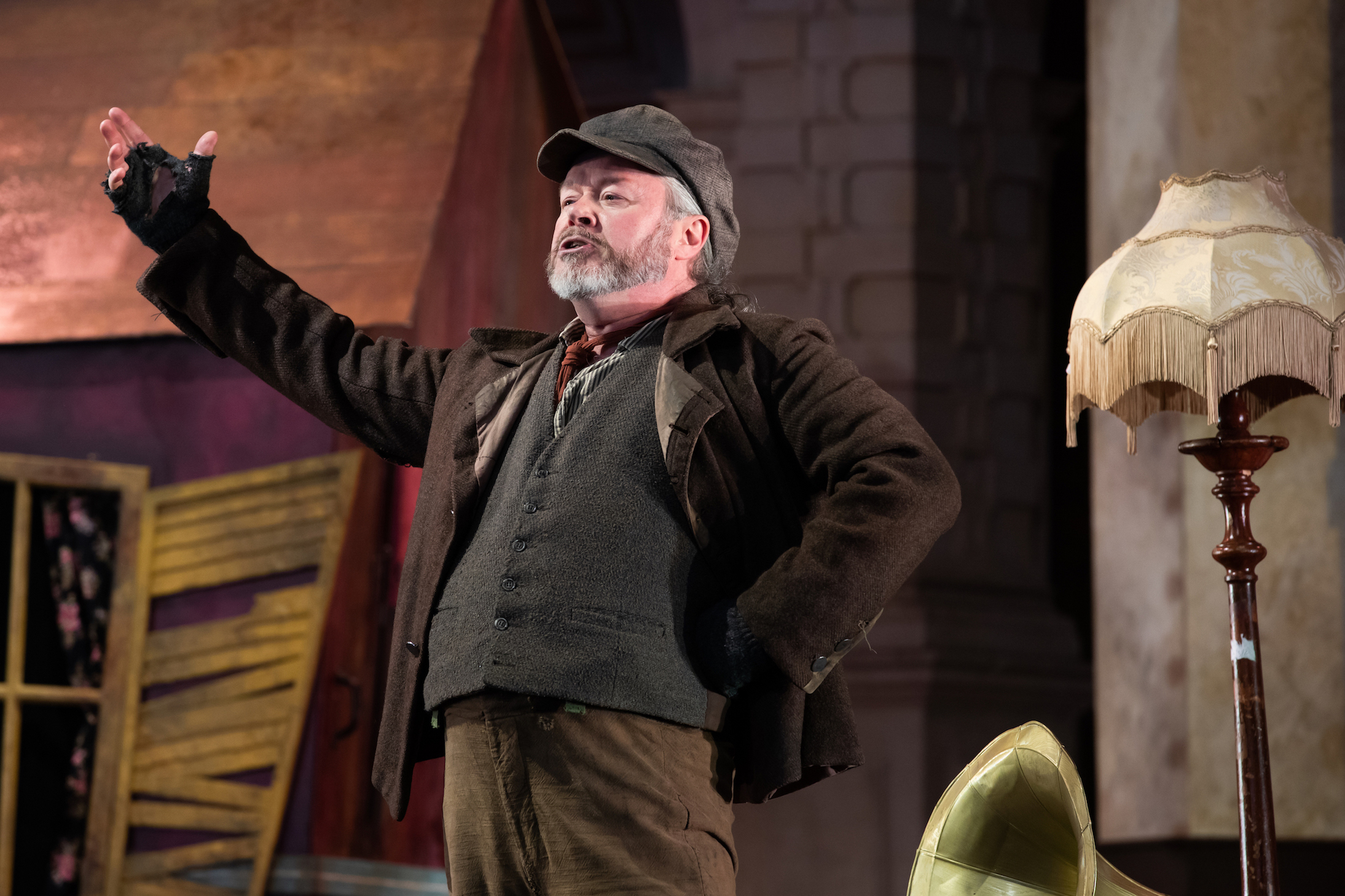 Wilkie effected a smooth transition from this ballad-style burlesque to the magical Wagnerian interlude of the children’s strawberry-picking expedition. Surrounded as it is by an actual wooded park, Neil Irish’s set did not try too hard for sylvan illusionism: bare columns stood in for trees, but they glowed with the crepuscular shades of Robert Price’s atmospheric lighting design. Huddled in front of the players, Badham and Perešivana gave Humperdinck’s glorious Evening Hymn power as well as grace, as the orchestra conjured a lavish swell of sound from their relatively modest forces. Their big-boned, broad-shouldered, late-Romantic tones belied smallish numbers.
Wilkie effected a smooth transition from this ballad-style burlesque to the magical Wagnerian interlude of the children’s strawberry-picking expedition. Surrounded as it is by an actual wooded park, Neil Irish’s set did not try too hard for sylvan illusionism: bare columns stood in for trees, but they glowed with the crepuscular shades of Robert Price’s atmospheric lighting design. Huddled in front of the players, Badham and Perešivana gave Humperdinck’s glorious Evening Hymn power as well as grace, as the orchestra conjured a lavish swell of sound from their relatively modest forces. Their big-boned, broad-shouldered, late-Romantic tones belied smallish numbers.
As for April Koyejo-Audiger’s Sandman, wheeled on in a kind of sail-rigged bathtub-boat, she confirmed that this Grimm forest felt – as it should be – funny and scary all at once. The animal-masked chorus of guardian angels (pictured below), sturdily supplemented by young performers from the Cardinal Vaughan Memorial School, brought moments of true enchantment to the bedtime masquerade. A tutu-ed Dew Fairy – Charlotte Bowden – arrived to wake the children while pedalling another, posher, bike: evidently, Wilkie was unafraid of a touch or three of camp. By now, the comic muse had jumped back in the saddle again.
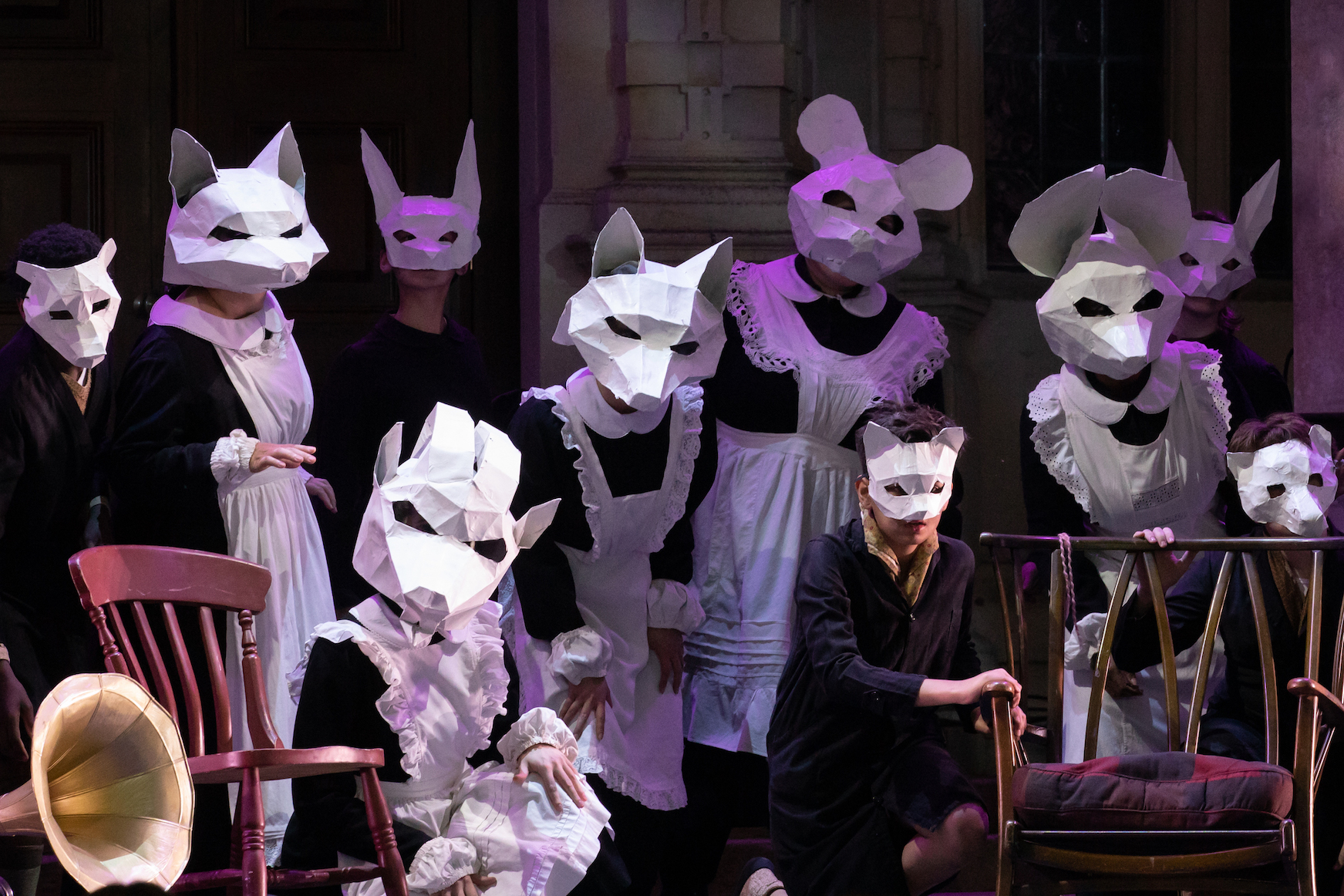 So how would Wilkie present the Gingerbread Witch and her cannibalistic lures? He eschewed the tenor-in-drag solution: old hat by now. Instead, Eleanor Dennis’s kid-eating sorceress circumvented our present-day discomfort with evil old crones in unexpected style. Riotously festooned with fairy-lights, her cake-constructed cottage emerged as the reverse side of the parents’ caravan-hovel. And Dennis, who brought enormous relish and panache to every phrase, executed a sudden change of identity herself. She began as a Dietrich-era vamp in glittery scarlet gown, only to shed the frock and morph into a strutting Fascist autocrat, all boots, breeches and plus-size epaulettes (pictured below). Yes, that will dispense with contemporary worries about folk-tale ageism-sexism, but maybe at the cost of a certain dramatic incoherence?
So how would Wilkie present the Gingerbread Witch and her cannibalistic lures? He eschewed the tenor-in-drag solution: old hat by now. Instead, Eleanor Dennis’s kid-eating sorceress circumvented our present-day discomfort with evil old crones in unexpected style. Riotously festooned with fairy-lights, her cake-constructed cottage emerged as the reverse side of the parents’ caravan-hovel. And Dennis, who brought enormous relish and panache to every phrase, executed a sudden change of identity herself. She began as a Dietrich-era vamp in glittery scarlet gown, only to shed the frock and morph into a strutting Fascist autocrat, all boots, breeches and plus-size epaulettes (pictured below). Yes, that will dispense with contemporary worries about folk-tale ageism-sexism, but maybe at the cost of a certain dramatic incoherence?
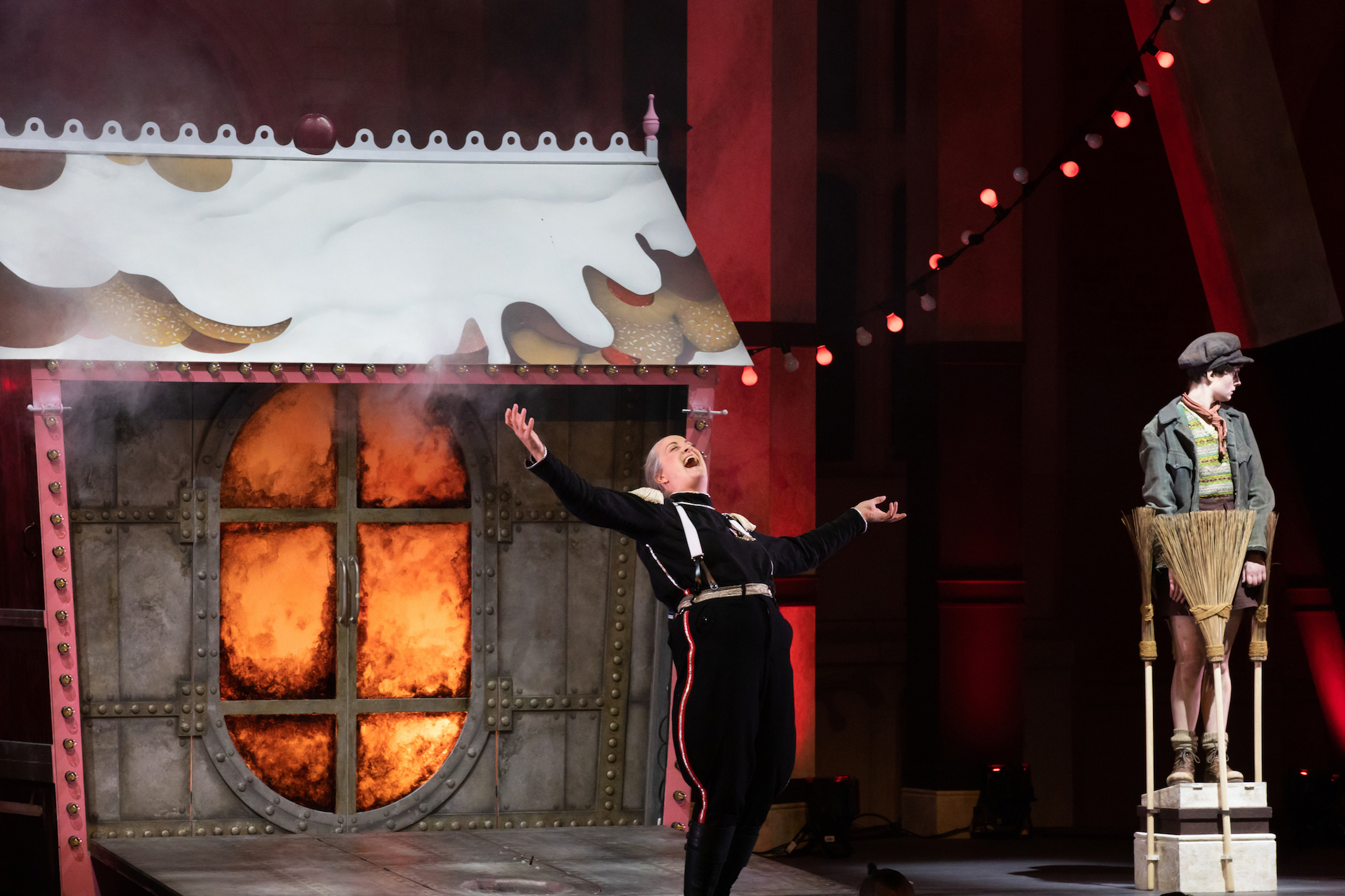 At any rate, the smoke and flames from the oven she prepared for the kids felt properly ghastly, even if her comeuppance seemed a bit perfunctory (“You’re toast!”). Costume changes aside, Dennis sang with unflagging dash and brio, requiring no demonic assistance to ace top notes while her cookies crumbled. As the Witch’s previous victims returned to life, carrying what looked like super-sized Quality Street, we closed with a witty reminder that the cake-and-chocolate dreams of anxious, deprived children may not only exist in the realms of operatic fantasy. Singers and orchestra, meanwhile, made us hear how cleverly Humperdinck’s finale unites the demotic and otherworldly sides of his wonderfully calorific score. With the Witch back on stage in cake-enhanced form, all looked – and sounded – good enough to scoff for seconds. OHP’s Gothic gâteau rose delectably to the occasion. Audiences will surely wolf it down with glee.
At any rate, the smoke and flames from the oven she prepared for the kids felt properly ghastly, even if her comeuppance seemed a bit perfunctory (“You’re toast!”). Costume changes aside, Dennis sang with unflagging dash and brio, requiring no demonic assistance to ace top notes while her cookies crumbled. As the Witch’s previous victims returned to life, carrying what looked like super-sized Quality Street, we closed with a witty reminder that the cake-and-chocolate dreams of anxious, deprived children may not only exist in the realms of operatic fantasy. Singers and orchestra, meanwhile, made us hear how cleverly Humperdinck’s finale unites the demotic and otherworldly sides of his wonderfully calorific score. With the Witch back on stage in cake-enhanced form, all looked – and sounded – good enough to scoff for seconds. OHP’s Gothic gâteau rose delectably to the occasion. Audiences will surely wolf it down with glee.

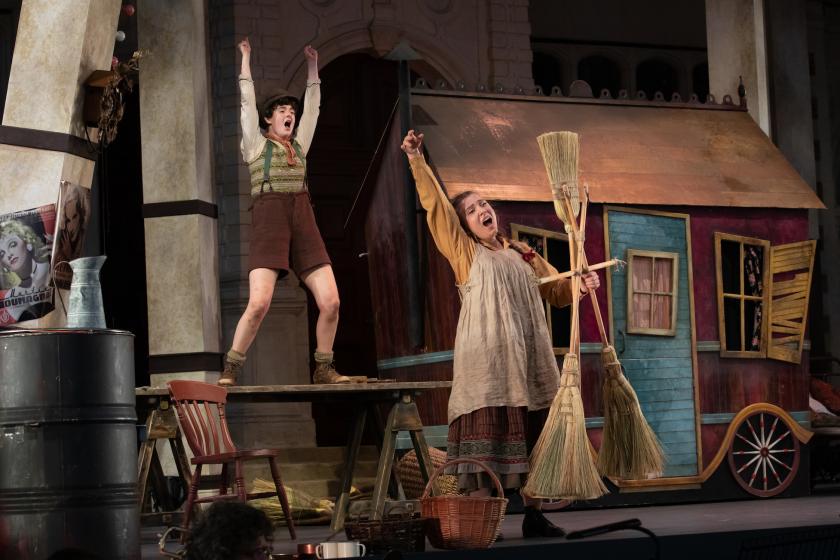












Add comment